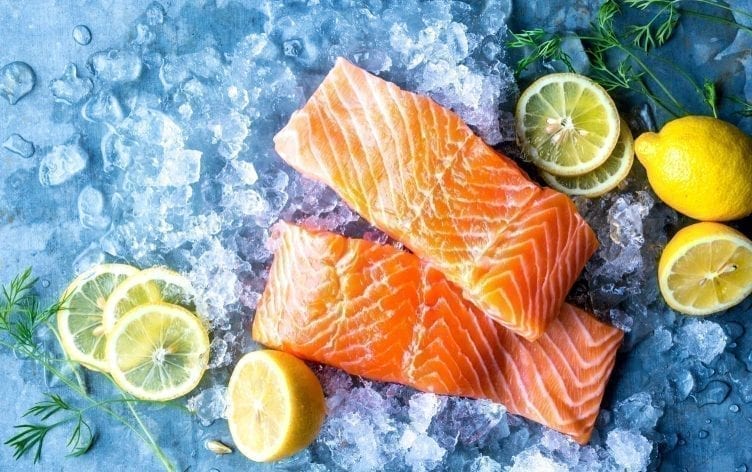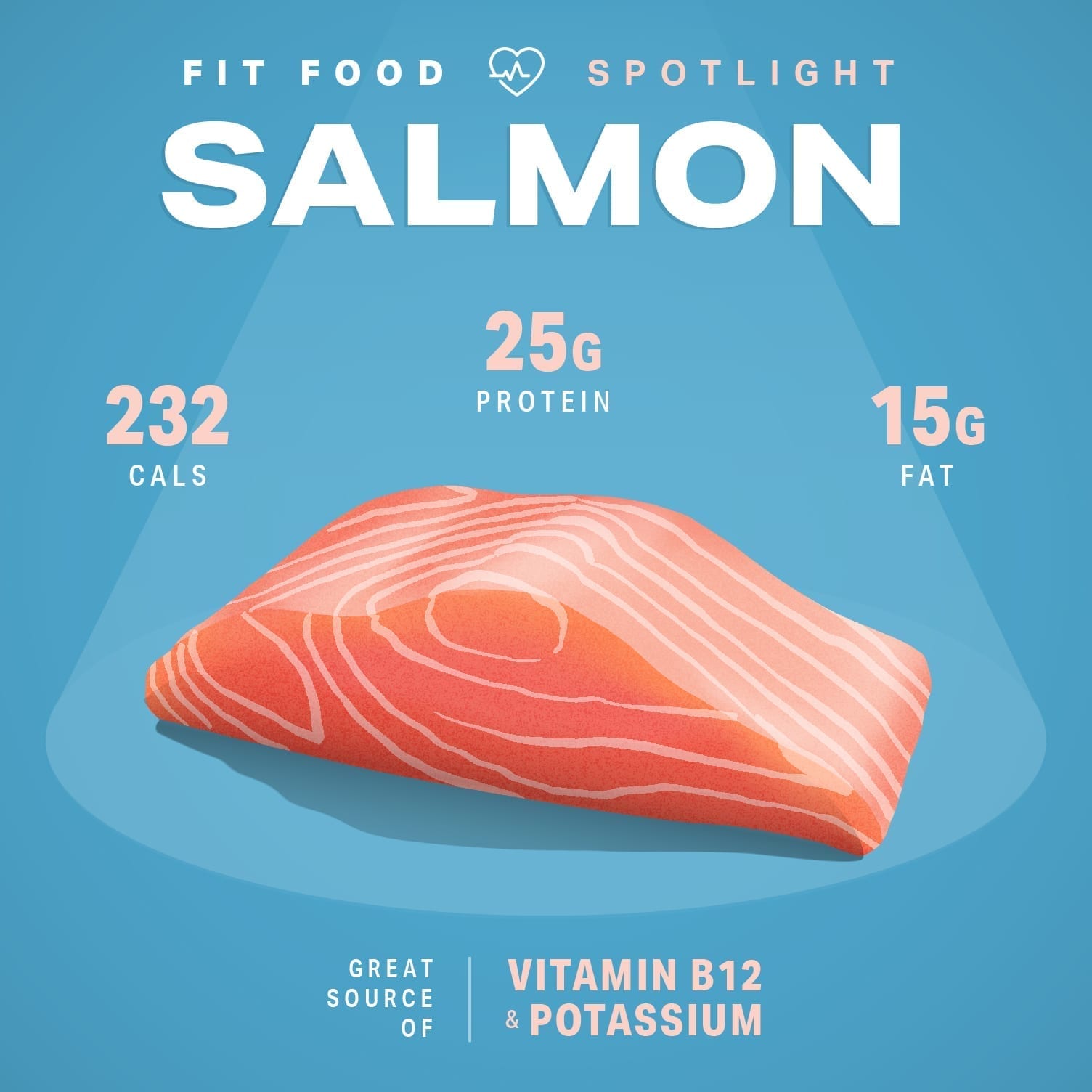

NUTRITIONAL BENEFITS OF SALMON
This fatty fish is one of the most nutritious foods around. Each 100-gram portion (roughly 3.5 ounces) contains about 232 calories, 25 grams of protein and 14.6 grams of fat along with good amounts of vitamin B12 and potassium.
Even when fat was viewed as bad for us, fatty fish was considered the exception. The main reason for this is its content of essential omega-3 fatty acids DHA and EPA. Essential means your body cannot make this type of fat — you have to get it from your diet. The National Institutes of Health recommend adults obtain at least 1 gram/day of omegas while many other health experts suggest intake should be closer to 2.5 grams a day, which happens to be about what you find in a 3.5-ounce (100g) portion of salmon. Not only that, but sources of these omega-3’s are limited, making salmon a great way to get what you need. These omegas are linked to brain development (fish is called brain food for a reason) and improvements in cardiac health. Start benefiting your body, mind and performance by adding at least two servings of salmon weekly to your diet.
PERFORMANCE-ENHANCING FACTORS
Salmon is definitely good for the body and those health benefits spill over into athletic performance, making this fatty fish a serious super food for any athlete. The 25 grams of protein fit perfectly within the recommended range (20–30 grams) of protein that should be consumed at each meal. Less protein isn’t likely to stimulate muscle repair or gains and more at the same sitting is likely to be stored.
The arterial benefits provided by salmon do more than help prevent heart disease; it boosts your athletic ability to deliver oxygen and blood flow to working lungs and muscles. Omega fatty acids might also act as an anti-inflammatory agent, helping decrease chronic inflammation that might lead to joint pain and stiffness. A powerful benefit of salmon is it supplies 50% of daily needs for vitamin B12, a nutrient that helps convert the food you eat into energy to burn. If you consume energy drinks for a pre-workout boost, most of that boost comes from the B12 content. The potassium is also a win for athletes as the important electrolyte plays a role in nerve-muscle interactions and helps balance a high sodium intake. In addition to DHA lending salmon the name of ‘brain food,’ it also supplies the name ‘mood food’ as this important omega-3 can positively affect mood disorders such as depression. Any athlete caught up in the pressures of competition, dealing with an injury or even experiencing post-race blues can benefit from a mood boost.
FARMED VERSUS WILD
There is much debate surrounding farmed and wild salmon. Traditionally, wild salmon has been best. Just like grass-fed, pasture-raised animals have healthier nutrition profiles than caged and corn-fed animals, wild fish have enhanced nutrition over farmed. This comes mostly in the fat profile. Wild fish have slightly more of the total fat coming from those essential, health-promoting omega-3 fatty acids. The downside to wild salmon varieties is they are more expensive and less accessible.
Farmed salmon has come a long way. Many fish farms are stepping up to create sustainable supplies of salmon that help prevent overfishing, improve fish populations, control feeding and decrease exposure to pollution (all things not well controlled in the wild).
It is important to remember that environmental conditions affect both wild and farmed salmon. Do your research about where your salmon comes from. If the top of the line, wild-caught version isn’t an option for you, that shouldn’t keep you from consuming it altogether.
BEST WAYS TO EAT SALMON
Fresh salmon can be daunting, but don’t let that stop you from eating it. The fish cooks easily on the stovetop and when roasted or grilled. All it needs is a squeeze of lemon and sprinkle of herbs/spices. Of course, there are more options beyond a fresh-caught filet.
- Canned salmon is readily available and actually contains the additional health benefit of calcium from the small (and edible) fish bones packed along with the flesh.
- Hot or cold smoked salmon can be a great replacement for deli meats and an easy, no-cook meal addition.
- Salmon jerky is sold at many health and camping stores and can be a great option to toss into your sport bag for an on-the-go snack.
However, you like your salmon, aim to pair it with whole grains and lots of produce to create a balanced meal.
BOTTOM LINE
Upping your fatty fish intake is likely a good thing. If salmon is too fishy for you, ahi tuna, sardines and mackerel have similar benefits. The FDA recommends up to 12 ounces of salmon a week as it has such a high-quality health profile and lower risk of mercury contamination than other seafood.



